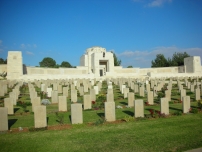| First Name: | Herbert | Last Name: | PAKEMAN | |
|---|---|---|---|---|
| Date of Death: | 19/04/1917 | Lived/Born In: | Knightsbridge | |
| Rank: | Lieutenant | Unit: | Hampshire8 | |
| Memorial Site: | Jerusalem Memorial | |||
Current Information:Age-24 23, Cadogan Place, Knightsbridge
After the Western Front, the second largest theatre of war between 1914 and 1918 was Egypt and Palestine. Britain had long had a foothold in Egypt guarding the vitally important Suez Canal and when war was declared against Turkey (the Ottoman Empire) who controlled all of what is now known as the Middle East, British troops were sent to guard the canal from attacks from the north. For the first two years of the war the British forces were on the defensive as the Turks, backed by the Germans, made a number of attempts against the canal but an important victory in August 1916 at Rumani relieved the pressure and the British force was then able to move onto the offensive and advance north into Palestine. By March 1917 they had concentrated at Rafah and were ready to attack the coastal town of Gaza and the fortifications running east from there to Beersheba. The First Battle of Gaza which was launched on 26th March, 1917, failed to break through the Turkish lines despite the numerical advantage of the British. The casualty list was high as well and it was only by down playing the figures that the commanders in Palestine were able to persuade their political masters back in London that another attempt was a feasible proposition. The Second Battle of Gaza began on 17th April, 1917 but unlike in the First Battle the Turks were now much better prepared. Their defences were greatly improved not only around Gaza City but also along the road running east to Beersheba. Unable to outflank the Turks the British army had no alternative but to attack head on but using three divisions this time rather than just two and with the added advantage of eight tanks. But in the end the result was the same as the first battle. The infantry were unable to break through the determined Turkish defence, the tanks proved practically useless in the desert conditions and after three days the battle was called off with the British retiring to their former lines to lick their wounds. The British had suffered over 6,000 casualties, three times as many as the Turks. The first two days of the battle saw the three infantry divisions moving forward, 53rd advanced up the coast while 52nd Division and 54th Division took up position from which they could attack the town from the the south and from the ridges in the east. This was accompanied by an artillery bombardment of the Turkish defences which continued through to the next day. The main infantry attack came on 19th April. 54th Division attacked at 7.30am with 163 Brigade on the left and 162 Brigade on the right. The 4th Norfolk and 5th Norfolk battalions led the way on 163 Brigade’s front with the 8th Hampshire battalion following in close support advancing towards the Gaza-Beersheba road across 2500 yards of undulating ground. It soon became obvious that the British artillery bombardment had not silenced the enemy guns when the enemy, who had been largely silent up until this point, now opened up with heavy artillery and machine-gun fire. The troops pressed on as best as they could making use of any favourable ground for cover but sustaining heavy casualties as they did so. With the aid of a tank, an enemy strongpoint on the right of 163 Brigade was attacked and taken but the Turkish guns then plastered it, destroying the tank and many of those following it. Despite the heroic efforts of those involved the attack, all along the British line came to a standstill. The three battalions of 163 Brigade had lost over 1500 men and were still 400 yards away from their objective. Without artillery support any further efforts were useless and those who remained dug in to await nightfall when 5th Suffolk moved up and the position was consolidated. 8th Hampshire had suffered terrible casualties of over 500 killed, wounded or missing. One of those killed was Herbert Pakeman. |
||||
| « Back to Search Results | ||||
| If you think any of the information shown here is incorrect, Click Here to submit your amends and comments | ||||




